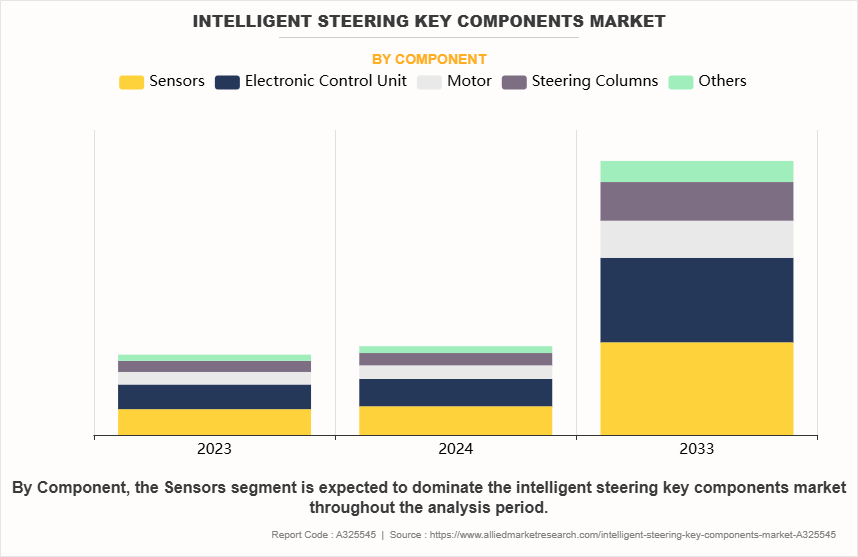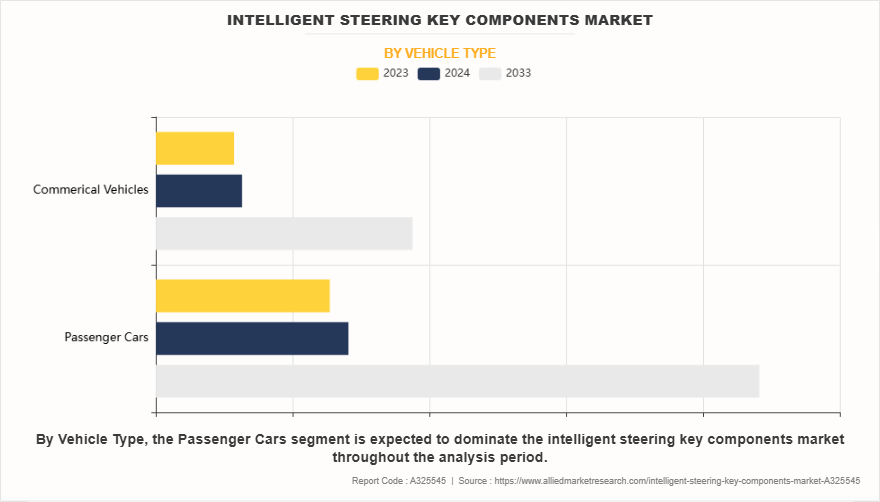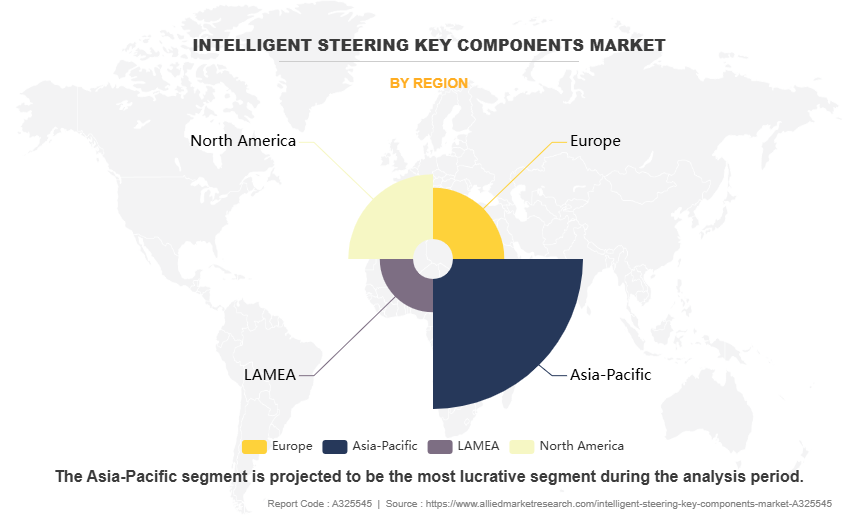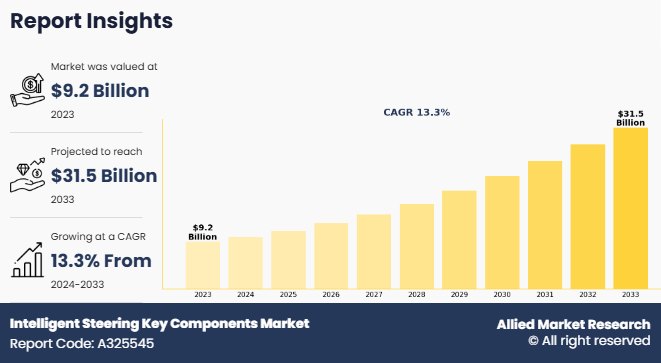Intelligent Steering Key Components Market Research, 2033
The global intelligent steering key components market size was valued at $9.2 billion in 2023, and is projected to reach $31.5 billion by 2033, growing at a CAGR of 13.3% from 2024 to 2033.
Report Key Highlighters
• The intelligent steering key components industry studies more than 16 countries. The analysis includes a country-by-country breakdown analysis in terms of value available from 2022 to 2032.
• The research combined high-quality data, professional opinion and research, with significant independent opinion. The research methodology aims to provide a balanced view of the global market, and help stakeholders make educated decisions to achieve ambitious growth objectives.
• The research reviewed more than 3,700 product catalogs, annual reports, industry descriptions, and other comparable resources from leading industry players to gain a better understanding of the market.
• The intelligent steering key components market share is marginally fragmented, with players such as Johnson Electric Holdings Limited, Nexteer Automotive Holdings Co., Ltd., HELLA GmbH & Co. KGaA, FUTEK Advanced Sensor Technology, Inc., Methode Electronics Inc., Continental AG, Robert Bosch GmbH, JTEKT Corporation, Nidec Corporation, and GKN Automotive. Major strategies such as contracts, partnerships, expansion, and other strategies of players operating in the market are tracked and monitored.
Key Developments/Strategies in Intelligent Steering Key Components
- In January 2024, Florida's lidar company Luminar unveiled an automatic emergency steering (AES) feature powered by its Iris Plus sensor at CES. The technology, with a 300-meter range, proactively prevents crashes by detecting obstacles and initiating driving maneuvers without driver intervention, surpassing traditional automatic emergency braking.
- In July 2022, NSK Ltd. contributes to advancements in transmission technologies, supporting more efficient and eco-friendly vehicles. Moreover, car steering systems are becoming more electrified. Electric Power Steering (EPS) conserves energy by using a motor for assistance only when needed. NSK specializes in Column Type EPS with a torque sensor for efficient driver-to-wheel communication.
- In November 2022, ZF outlined plans to invest around $100 million to expand product offerings and production capacity for chassis components at the Zhangjiagang facility. This production site will craft steering knuckles, control arms, steering tie rods, and stabilizer links, effectively encompassing various chassis components.
Market Definition and Introduction
Intelligent steering key components refer to advanced electronic and mechanical systems integrated into vehicle steering components that enhance functionality, security, and convenience. These components utilize intelligent key technology, which allows drivers to operate and control the steering components with minimal manual effort, often through wireless communication, sensors, or electronic controls.
The growing demand for advanced safety and convenience features in modern vehicles is driving the expansion of the intelligent steering key components industry. These components are revolutionizing vehicle control by enhancing security, enabling keyless operations, and optimizing driving experiences through automation. Integration with advanced driver-assistance systems (ADAS) further improves steering precision and safety. Automated systems in intelligent steering key components streamline functions such as locking, unlocking, and immobilizing the steering system, ensuring enhanced vehicle security and convenience for users. However, the complexity in system integration are key challenges restraining market growth. In November 2023, Audi launched its Audi AI Traffic Jam Pilot system, featured in its premium passenger car lineup. The intelligent steering system enables hands-free driving in congested traffic conditions, utilizing high-resolution cameras, radar sensors, and precise mapping data to navigate through traffic and maintain safe distances from other vehicles.
The increase in demand for automotive owing to rise in disposable income of consumers primarily drive the growth of the market. In addition, the adoption of power steering components in vehicles is responsible for the growth of this market. The effective steering components account for the increase in fuel efficiency of the vehicle. Hence, the increase in demand for fuel efficient vehicles results in an increase in demand for steering systems. Driving comfort is achieved by using effective steering components resulting in an increase in demand for steering components implementing growth of this market. However, the complexity in system integration is expected to hamper the growth of the intelligent steering key components market size. Technology such as drive-by-wire is expected to be implemented in the upcoming vehicles, thus boosting the growth of the market in the near future.
Market Dynamics
Rise in integration with ADAS and autonomous driving
The integration of ADAS (Advanced Driver Assistance Systems) and autonomous driving technologies is revolutionizing modern vehicles by enhancing safety, automation, and driver convenience. Features such as lane-keeping assistance, adaptive cruise control, automated parking, and lane-change assistance depend on precise steering inputs and real-time data to ensure accurate vehicle control. For instance, in August 2023, Pony.ai, a U.S.-based software company, partnered with Toyota Motor (China) Investment Co., Ltd. and GAC Toyota Motor Co., Ltd. to create a joint venture aimed at advancing fully driverless robotaxis for mass production and deployment. This initiative combines Pony.ai's autonomous driving tech, Toyota's branded electric vehicles, and GTMC's production expertise. Intelligent steering key components play a crucial role in enabling these advancements by ensuring secure and efficient operation of intelligent steering systems. These components, including electronic control units (ECUs), steering locks, and wireless communication modules, enhance security by preventing unauthorized access and theft while allowing seamless communication between the intelligent key and the vehicle's steering system.
High complexity in system integration
The intelligent steering systems must seamlessly connect various advanced technologies, including sensors, electronic control units (ECUs), and wireless communication modules, while ensuring compatibility with the vehicle’s overall architecture. Integrating intelligent key steering systems with other advanced vehicle systems, such as ADAS (Advanced Driver Assistance Systems) and autonomous driving technologies requires precise coordination between hardware and software components. This complexity often leads to longer development cycles and higher costs for manufacturers, especially as vehicles become more technologically sophisticated. In addition, the lack of standardization across manufacturers and regions adds to the difficulty of system integration. Different automakers use varied protocols and system designs, making it challenging to create universally compatible solutions. Moreover, ensuring the reliability and security of these interconnected systems is crucial, as any malfunction or breach could compromise vehicle safety and functionality. It requires significant technical expertise, advanced testing processes, and collaboration between automakers and component suppliers, which can further slow down product development and adoption in the intelligent steering key components market growth.
Growing demand for steering angle sensors will create lucrative growth opportunities
The growing demand for steering angle sensors is creating significant growth opportunities in the automotive market. These sensors play a critical role in modern vehicles by measuring the steering wheel's position, direction, and rotation angle, which are essential for advanced driver assistance systems (ADAS) and autonomous driving technologies. Features such as lane-keeping assistance, adaptive cruise control, and electronic stability programs (ESP) rely heavily on accurate steering angle data to enhance vehicle safety and performance. As automakers continue to integrate advanced safety features into vehicles, the demand for reliable and precise steering angle sensors is expected to rise. Furthermore, the shift toward electric vehicles (EVs) and the increasing adoption of connected and autonomous vehicles are driving the need for more sophisticated steering angle sensors. These sensors not only improve driving comfort and control but also support real-time data sharing for vehicle-to-vehicle (V2V) and vehicle-to-infrastructure (V2I) communication. With advancements in sensor technology, including miniaturization and improved accuracy, manufacturers have an opportunity to tap into this growing demand by offering innovative and cost-effective solutions, creating lucrative growth opportunities in the intelligent steering key components market forecast.
Segment Review
The intelligent steering key components market is segmented into components, application and region. By component, the market is divided into sensor, electronic control units, motor, steering columns, and others. On the basis of vehicle type, the market is classified into passenger cars and commercial vehicles. Region-wise, the intelligent steering key components market trends are analyzed across North America (U.S., Canada, and Mexico), Europe (UK, Germany, France, Russia, and rest of Europe), Asia-Pacific (China, India, Japan, Australia, South Korea, and rest of Asia-Pacific), and LAMEA (Latin America, the Middle East, and Africa).

By Component
By component, the market is divided into sensor, electronic control units, motor, steering columns, and others. Sensors segment accounted for the largest share in 2023. This segment is driven by the growing integration of advanced sensor technologies in intelligent steering systems to enhance vehicle safety and stability. The increasing adoption of steer-by-wire and electronic power steering (EPS) systems, along with the rising demand for real-time data processing in autonomous and semi-autonomous vehicles, has further fueled the dominance of this segment in intelligent steering key components market demand.

By Vehicle Type
On the basis of vehicle type, the market is classified into passenger cars and commercial vehicles. The passenger cars segment holds a significant share, driven by the increasing demand for advanced safety features, improved driving comfort, and the growing integration of intelligent steering systems in modern vehicles. Meanwhile, the commercial vehicles segment is witnessing steady growth due to the rising adoption of electronic power steering (EPS) and steer-by-wire technologies to enhance fuel efficiency, reduce driver fatigue, and improve vehicle handling in heavy-duty applications.

By Region
Region-wise, the intelligent steering key components market trends are analyzed across North America (U.S., Canada, and Mexico), Europe (UK, Germany, France, Russia, and rest of Europe), Asia-Pacific (China, India, Japan, Australia, South Korea, and rest of Asia-Pacific), and LAMEA (Latin America, the Middle East, and Africa). Asia-Pacific region dominated the market in 2023, driven by the rapid expansion of the automotive industry, increasing adoption of electric and autonomous vehicles, and rising investments in advanced steering technologies. The presence of key automotive manufacturers, coupled with supportive government policies promoting vehicle safety and fuel efficiency, has further fueled market growth.
Competitive Analysis
Competitive analysis and profiles of the major global intelligent steering key components market players that have been provided in the report include Johnson Electric Holdings Limited, Nexteer Automotive Holdings Co., Ltd., HELLA GmbH & Co. KGaA, FUTEK Advanced Sensor Technology, Inc., Methode Electronics Inc., Continental AG, Robert Bosch GmbH, JTEKT Corporation, Nidec Corporation, and GKN Automotive. The key strategies adopted by the major players of the global intelligent steering key components market are product launch and mergers & acquisitions.
Top Impacting Factors
The global intelligent steering key components market is expected to witness notable growth registering a CAGR of 13.3%, The intelligent steering key components market is expected to witness notable growth owing to rise in integration with ADAS and autonomous driving, increase in demand for automotive steering systems. Growing demand for steering angle sensors are expected to provide lucrative opportunities for market growth. However, high complexity in system integration may hamper market expansion.
Historical Data & Information
The global intelligent steering key components market is competitive, owing to the strong presence of existing vendors. Vendors in the global intelligent steering key components market with extensive technical and financial resources are expected to gain a competitive advantage over their competitors as they can cater to market demands, which are higher than the supply. The competitive environment in this market is expected to increase owing to technological innovations, product extensions, and different strategies adopted by key vendors.
Key Benefits For Stakeholders
- This report provides a quantitative analysis of the market segments, current trends, estimations, and dynamics of the intelligent steering key components market analysis from 2023 to 2033 to identify the prevailing intelligent steering key components market opportunities.
- The market research is offered along with information related to key drivers, restraints, and opportunities.
- Porter's five forces analysis highlights the potency of buyers and suppliers to enable stakeholders make profit-oriented business decisions and strengthen their supplier-buyer network.
- In-depth analysis of the intelligent steering key components market segmentation assists to determine the prevailing market opportunities.
- Major countries in each region are mapped according to their revenue contribution to the global market.
- Market player positioning facilitates benchmarking and provides a clear understanding of the present position of the market players.
- The report includes the analysis of the regional as well as global intelligent steering key components market trends, key players, market segments, application areas, and market growth strategies.
Intelligent Steering Key Components Market Report Highlights
| Aspects | Details |
| Market Size By 2033 | USD 31.5 billion |
| Growth Rate | CAGR of 13.3% |
| Forecast period | 2023 - 2033 |
| Report Pages | 324 |
| By Component |
|
| By Vehicle Type |
|
| By Region |
|
| Key Market Players | GKN Automotive, Johnson Electric Holdings Limited, FUTEK Advanced Sensor Technology, Inc., Continental AG, Nexteer Automotive Holdings Co., Ltd., NIDEC CORPORATION, JTEKT Corporation, Methode Electronics Inc., Robert Bosch GmbH, HELLA GmbH & Co. KGaA |
The passenger cars are the leading vehicle type of intelligent steering key components market.
The upcoming trends of Intelligent Steering Key Components Market include rise in integration with ADAS and autonomous driving, increase in demand for automotive steering systems.
Asia-Pacific is the largest regional market for intelligent steering key components.
The global intelligent steering key components market was valued at $9.2 billion in 2023.
Johnson Electric Holdings Limited, Nexteer Automotive Holdings Co., Ltd., HELLA GmbH & Co. KGaA, FUTEK Advanced Sensor Technology, Inc., Methode Electronics Inc. are the some of the top companies to hold the market share in Intelligent Steering Key Components.
Loading Table Of Content...
Loading Research Methodology...



